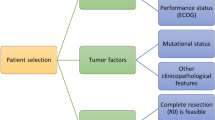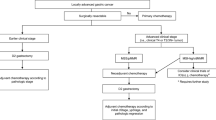Abstract
Background
Peritoneal metastases (PM) are a well-known poor prognostic factor. The aim of this study was to investigate the factors affecting recurrence and prognosis after R0 resection for colorectal cancer with synchronous peritoneal metastases.
Methods
We conducted a multi-institutional retrospective analysis of 72 patients without distant metastases who underwent R0 surgery between 1991 and 2007 for colorectal cancer with PM localized to the adjacent peritoneum. Clinicopathological variables were analyzed for their significance to recurrence and prognosis.
Results
Recurrence was found in 51 patients (70.8 %) after R0 surgery. In logistic regression analyses, lymph node metastasis was shown to be an independent factor affecting recurrence. Non-intensive or no postoperative chemotherapy and eight or fewer dissected lymph nodes were identified as independent poor prognostic factors using the Cox proportional hazards model. Among patients who received postoperative chemotherapy, prognosis was significantly better in those who received intensive adjuvant chemotherapy using camptothecin-11 or oxaliplatin after R0 surgery than in those who received non-intensive chemotherapy. Among 47 patients whose recurrence date was known, 33 patients (70.2 %) experienced recurrence within 18 months after R0 surgery for peritoneal metastases, and hematogenous recurrence was observed significantly more often than peritoneal recurrence.
Conclusions
Harvesting of more than eight lymph nodes and administration of intense adjuvant chemotherapy after R0 surgery are recommended for greater prediction accuracy and improved prognosis. Intensive follow-up should be performed within 18 months after R0 surgery for colorectal cancer with synchronous peritoneal metastases.



Similar content being viewed by others
References
Jayne DG, Fook S, Loi C, Seow-Choen F. Peritoneal carcinomatosis from colorectal cancer. Br J Surg. 2002;89(12):1545–50.
Kobayashi H, Enomoto M, Higuchi T, Uetake H, Iida S, Ishikawa T, et al. Validation and clinical use of the Japanese classification of colorectal carcinomatosis: benefit of surgical cytoreduction even without hyperthermic intraperitoneal chemotherapy. Digest Surg. 2010;27(6):473–80.
Sobin L, Gospondarowicz M, Wittekind C. TNM Classification of malignant tumors. UICC International Union Against Cancer. 7th ed. New York: Wiley; 2009. p. 100–5.
Gilly FN, Carry PY, Sayag AC, et al. Regional chemotherapy (with mitomycin C) and intra-operative hyperthermia for digestive cancers with peritoneal carcinomatosis. Hepatogastroenterology. 1994;41(2):124–9.
Jacquet P, Sugarbaker PH. Clinical research methodologies in diagnosis and staging of patients with peritoneal carcinomatosis. Cancer Treat Res. 1996;82:359–74.
Japan Society for Cancer of the Colon and Rectum, editors. Japanese classification of colorectal carcinoma. 2nd ed. Tokyo: Kanehara & Co; 2009.
Sugarbaker PH. Successful management of microscopic residual disease in large bowel cancer. Cancer Chemother Pharmacol. 1999;43(Suppl):S15–25.
Witkamp AJ, de Bree E, Kaag MM, et al. Extensive cytoreductive surgery followed by intra-operative hyperthermic intraperitoneal chemotherapy with mitomycin-C in patients with peritoneal carcinomatosis of colorectal origin. Eur J Cancer (Oxford, England: 1990). 2001;37(8):979–84.
Kobayashi H, Kotake K, Funahashi K, et al. Clinical benefit of surgery for stage IV colorectal cancer with synchronous peritoneal metastasis. J Gastroenterol. 2014;49(4):646–54.
Ozawa H, Kotake K, Kobayashi H, Kobayashi H, Sugihara K. Prognostic factors for peritoneal carcinomatosis originating from colorectal cancer: an analysis of 921 patients from a multi-institutional database. Surg Today. 2014;44(9):1643–50.
Kobayashi H, Kotake K, Sugihara K. Enhancing the objectivity of the Japanese classification of peritoneal metastases from colorectal cancer. Jpn J Clin Oncol. 2014;44(10):898–902.
Japan Society for Cancer of the Colon and Rectum, editors. JSCCR guidelines 2014 for the treatment of colorectal cancer. Tokyo: Kanehara & Co; 2014.
Nordlinger B, Vaillant JC, Guiguet M, et al. Survival benefit of repeat liver resections for recurrent colorectal metastases: 143 cases. Association Francaise de Chirurgie. J Clin Oncol. 1994;12(7):1491–6.
Simmonds PC, Primrose JN, Colquitt JL, Garden OJ, Poston GJ, Rees M. Surgical resection of hepatic metastases from colorectal cancer: a systematic review of published studies. Br J Cancer. 2006;94(7):982–99.
Stangl R, Altendorf-Hofmann A, Charnley RM, Scheele J. Factors influencing the natural history of colorectal liver metastases. Lancet. 1994;343(8910):1405–10.
Folprecht G, Gruenberger T, Bechstein WO, et al. Tumour response and secondary resectability of colorectal liver metastases following neoadjuvant chemotherapy with cetuximab: the CELIM randomised phase 2 trial. Lancet Oncol. 2010;11(1):38–47.
Malik H, Khan AZ, Berry DP, et al. Liver resection rate following downsizing chemotherapy with cetuximab in metastatic colorectal cancer: UK retrospective observational study. Eur J Surg Oncol. 2015;41(4):499–505.
Ye LC, Liu TS, Ren L, et al. Randomized controlled trial of cetuximab plus chemotherapy for patients with KRAS wild-type unresectable colorectal liver-limited metastases. J Clin Oncol. 2013;31(16):1931–8.
Elias D, Lefevre JH, Chevalier J, et al. Complete cytoreductive surgery plus intraperitoneal chemohyperthermia with oxaliplatin for peritoneal carcinomatosis of colorectal origin. J Clin Oncol. 2009;27(5):681–5.
Franko J, Ibrahim Z, Gusani NJ, Holtzman MP, Bartlett DL, Zeh HJ 3rd. Cytoreductive surgery and hyperthermic intraperitoneal chemoperfusion versus systemic chemotherapy alone for colorectal peritoneal carcinomatosis. Cancer. 2010;116(16):3756–62.
Pestieau SR, Sugarbaker PH. Treatment of primary colon cancer with peritoneal carcinomatosis: comparison of concomitant vs. delayed management. Dis Colon Rectum. 2000;43(10):1341–6 discussion 7–8.
Verwaal VJ, van Ruth S, de Bree E, et al. Randomized trial of cytoreduction and hyperthermic intraperitoneal chemotherapy versus systemic chemotherapy and palliative surgery in patients with peritoneal carcinomatosis of colorectal cancer. J Clin Oncol. 2003;21(20):3737–43.
Chua TC, Moran BJ, Sugarbaker PH, et al. Early- and long-term outcome data of patients with pseudomyxoma peritonei from appendiceal origin treated by a strategy of cytoreductive surgery and hyperthermic intraperitoneal chemotherapy. J Clin Oncol. 2012;30(20):2449–56.
de Jong MC, Pulitano C, Ribero D, et al. Rates and patterns of recurrence following curative intent surgery for colorectal liver metastasis: an international multi-institutional analysis of 1669 patients. Ann Surg. 2009;250(3):440–8.
Ohlsson B, Stenram U, Tranberg KG. Resection of colorectal liver metastases: 25-year experience. World J Surg. 1998;22(3):268–76 discussion 76–77.
Le Voyer TE, Sigurdson ER, Hanlon AL, et al. Colon cancer survival is associated with increasing number of lymph nodes analyzed: a secondary survey of intergroup trial INT-0089. J Clin Oncol. 2003;21(15):2912–9.
Franko J, Shi Q, Goldman CD, et al. Treatment of colorectal peritoneal carcinomatosis with systemic chemotherapy: a pooled analysis of north central cancer treatment group phase III trials N9741 and N9841. J Clin Oncol. 2012;30(3):263–7.
Klaver YL, Simkens LH, Lemmens VE, et al. Outcomes of colorectal cancer patients with peritoneal carcinomatosis treated with chemotherapy with and without targeted therapy. Eur J Surg Oncol. 2012;38(7):617–23.
Sadahiro S, Suzuki T, Maeda Y, et al. Prognostic factors in patients with synchronous peritoneal carcinomatosis (PC) caused by a primary cancer of the colon. J Gastrointest Surg. 2009;13(9):1593–8.
Author information
Authors and Affiliations
Corresponding author
Ethics declarations
Conflict of interest
All authors declare that they have no conflict of interest with regard to this manuscript.
Additional information
Study Group for Peritoneal Metastasis from Colorectal Cancer by the Japanese Society for Cancer of the Colon and Rectum.
Rights and permissions
About this article
Cite this article
Sato, H., Maeda, K., Kotake, K. et al. Factors affecting recurrence and prognosis after R0 resection for colorectal cancer with peritoneal metastasis. J Gastroenterol 51, 465–472 (2016). https://doi.org/10.1007/s00535-015-1122-8
Received:
Accepted:
Published:
Issue Date:
DOI: https://doi.org/10.1007/s00535-015-1122-8




